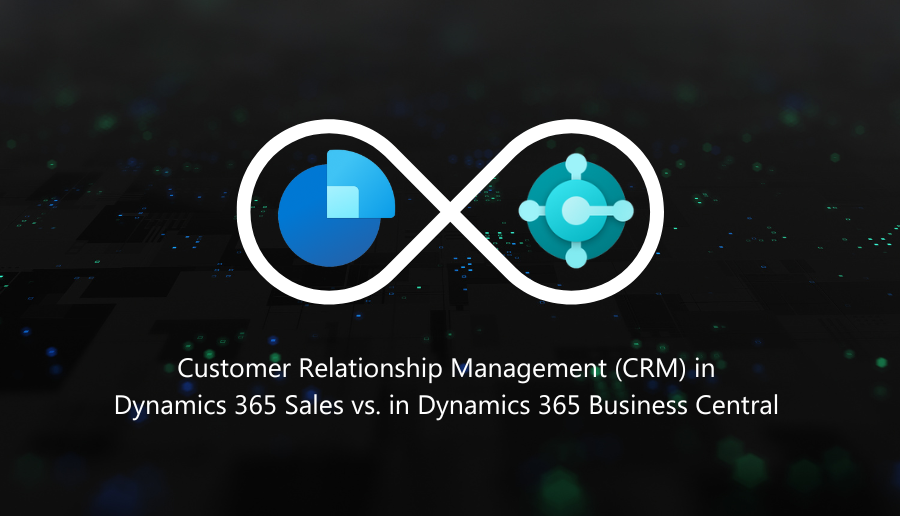Many who are currently using Dynamics 365 Business Central (D365 BC) need to track customer information, sales opportunities and marketing activities. D365 BC has some CRM functionality built in, but is it sufficient for what your organization needs?
This post explores the differences between the CRM capabilities available in D365 BC and those available in Dynamics 365 Sales (D365 Sales) to help differentiate between the two and determine which would be the best fit for your organization.
Understanding Dynamics 365: A Comprehensive Suite of Business Applications
Dynamics 365 is a suite of business applications offered by Microsoft that primarily include ERP applications and CRM applications. In this post, we’ll focus on the two most common:
- D365 BC is a cloud-based ERP offering, intended for SMBs who are looking to upgrade from their entry-level accounting software or legacy ERP system to one single, comprehensive solution. D365 BC is designed to help businesses manage their financials, manufacturing, projects, inventory management, shipping and more.
- D365 Sales is a cloud-based CRM solution, and its main purpose is to support sales teams and their associated activities. It allows teams to qualify leads, manage sales opportunities, build relationships with prospects and customers, organize and automate components of the sales process and more.
D365 BC and D365 Sales are two separate products and must be purchased and licensed individually.
Within D365 BC, there is Customer Relationship Management (CRM) functionalities to help support sales teams, however, it’s fairly basic in comparison with CRM systems that are designed specifically to manage customer relationships.
The Limitations of D365 BC’s CRM Capabilities
When business owners hear that D365 BC includes CRM capabilities, they inevitably ask themselves why they would pay for CRM licenses if the capabilities were already there in their ERP system.
If you’re a smaller organization with only 1 or 2 sales reps, or you have limited or minimal resources, then the CRM functionality that’s available in D365 BC might be all that you need. In general, once you have at least 5 customer-facing employees on the team, you should be looking into a CRM solution.
D365 BC’s CRM capabilities are fairly limited compared to what is available in D365 Sales. While D365 BC may be enough for some organizations’ contact and opportunity management needs, those looking for an end-to-end CRM solution may not find it sufficient. The basic sales management features within D365 BC include:
- Account Management
- Contact Management
- Opportunity Management
- Quote and Order Management
- Campaigns and Segments
Unsurprisingly, D365 Sales includes much more robust CRM functionality and are a better choice for companies who are looking for the above features and more. See below for additional functionality available in D365 Sales:
- Activity Management: An ERP system is focused mostly on tracking transactions. A CRM system’s primary focus is on tracking interactions. D365 BC doesn’t offer much in terms of planning and tracking tasks, emails, phone calls and appointments whereas D365 Sales offers many options to do this which makes account management and business development easier.
- Microsoft 365 integration, Outlook, SharePoint, Microsoft Teams: D365 Sales has a strong integration to many products in the Microsoft 365 suite (previously Office 365): SharePoint for document management, Teams for collaboration and modern ways of communication between departments, Outlook for productivity and organization such as tasks, emails and appointments, Word and Excel for templates, etc.
- Mobile App: There are many users these days who are out of the office and want to access or update customer information. D365 Sales includes a robust mobile app that can be accessed via just about any mobile operating system and includes offline data-sync.
- Configurable: D365 Sales is highly configurable which makes it easy to customize to support a wide range of needs and processes; adding new tables, fields, forms, views, charts and dashboards is very simple and doesn’t require a developer to do so.
- Automation: D365 Sales also includes the ability to automate actions with the use of workflows, business process flows, business rules, and more.
- Marketing automation functionality: Marketing Automation tools such as D365 Marketing, ClickDimensions or MailChimp for example are either integrated directly or work natively with D365 Sales. Having centralized customer data simplifies data segmentation and results in more powerful, targeted marketing. Another benefit of working within one platform is that it’s easy to link to your website and track customer journeys, providing you with more insights into how your prospects consume information, which makes your marketing efforts much more effective.
- Ability to leverage other D365 applications: Organizations who adopt D365 Sales and have other areas of their business related to Customer Service, Field Service and project management can easily add the other apps while using the same platform and having all data in one place.
Simplify Your Business Operations with D365 BC and D365 Sales (CRM) Integration
One very common approach is to integrate the two applications to get the best of both worlds. There are connectors available from Microsoft to simplify the integration, however, most organizations find that there’s some customization required to manage the custom fields and tables that need to be visible in both applications. That said, the end result is often worthwhile:
The Sales team works in the CRM system. The Finance team works in the ERP system. Each set of users are only licensed for the system in which they spend their time. With added integration, key data points remain in sync between both systems such as customer information, products, pricing, financials (e.g. order and invoices), etc., to ensure everyone has access to the right information to do their jobs.
The other great advantage of integrating D365 Sales and D365 Business Central is that they are both part of the Microsoft suite of business applications. This means that they communicate and sync with each other seamlessly, leading to higher efficiency and productivity. With both the CRM and ERP systems under one provider, users don’t have to work with different vendors or deal with integration issues. Moreover, Microsoft Dynamics 365 already includes AI, CoPilot, and Machine Learning (ML) in their software, which streamlines and automates integration processes.
This helps with quick and precise data generation that results in a deeper understanding of clients, quicker sales assistance, and smarter customer service. Additionally, the integration of these systems ensures that data is accurate and current, lowering the possibility of errors. By eliminating manual data entry, businesses can increase their efficiency while advanced reporting capabilities like Power BI integration, custom workflows, forms, and reports can be created to meet specific requirements.
Achieve Your Business’s Potential with a Dynamics 365 Partner
In conclusion, while D365 Business Central has some Customer Relationship Management (CRM) functionality built-in, it may not be sufficient for organizations looking for end-to-end CRM solutions. Once you have at least 5 customer-facing employees on the team, it’s best to consider integrating with D365 Sales. D365 Sales includes more robust CRM functionality, activity management, Microsoft 365 integration, mobile app, automation, marketing automation functionality, and the ability to leverage other D365 applications. Integrating the two applications is a common approach, but it may require customization. It’s best to work with a Microsoft Dynamics 365 Partner like Technology Management Concepts to guide you through a smooth integration and provide expert advice on upgrading to or integrating with D365 Sales. Contact us today to learn more.








